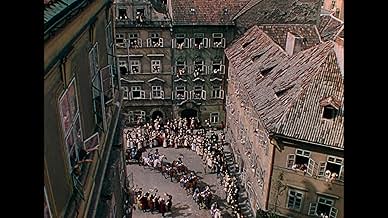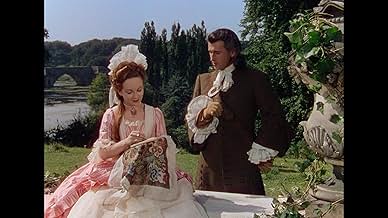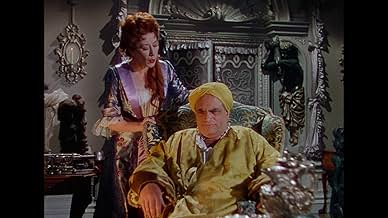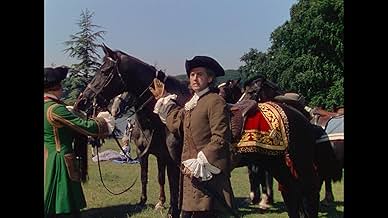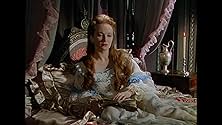AVALIAÇÃO DA IMDb
6,5/10
718
SUA AVALIAÇÃO
Adicionar um enredo no seu idiomaYoung Sophie Dorothea marries Prince George Louis but it's far from a love match. Then she falls for Swedish Count Philip Christoph von Königsmark.Young Sophie Dorothea marries Prince George Louis but it's far from a love match. Then she falls for Swedish Count Philip Christoph von Königsmark.Young Sophie Dorothea marries Prince George Louis but it's far from a love match. Then she falls for Swedish Count Philip Christoph von Königsmark.
- Direção
- Roteiristas
- Artistas
- Indicado a 1 Oscar
- 1 vitória e 2 indicações no total
Françoise Rosay
- The Electress Sophia
- (as Francoise Rosay)
Avaliações em destaque
With most of the reviews here rating the film at 8 and above, the overall score of 6.6 seems to indicate an unreasonable bias in favour of the sort of reviewer who thinks that 'cack' is a useful characterisation of this masterwork, or who superciliously thinks that perhaps film students could just admire the brief technical mastery of the montage sequence - which is indeed brilliant editing - but who then dismissively junks the rest of the film.
Actually, most of the reviewers here actually do ample justice to a production which excels in all departments, and succeeds in being a romantic film which balances passion with such intelligence that a powerful and moving tragic sense is conveyed of real people trapped in a world of inhuman artifice and formality. I think Dearden's work here has a powerful impact that is at least the equal of David Lean's later epics. It also often even reminded me of the sad fate of Kubrick's Barry Lyndon, like Koenigsmarck the commoner victim of a cruel aristocratic world, the reality of which is portrayed without illusions.
So why the poor overall rating? This really can't be justified, or tolerated, and I must be particularly lavish in my praise to help raise it up towards something nearer to it's true worth.
Once again, here in Britain, it was only thanks to the ever-excellent 'Talking Pictures TV' that we got a chance to see this neglected masterpiece at all. Really the general churlishness of modern neglect towards this utterly magnificent film is very hard to fathom.
Perhaps it is merely the jealousy of mediocrities who can never hope to grasp or emulate such an intelligent movie, in which the historical background is correctly but lightly established, or to command such a superbly well-constructed portrait of passion and intrigue in high places. In Britiain we seem to have developed an aversion to a past so often sweepingly dismissed as both hopelessly outmoded, as well as politically irredeemable, by an influential cultural cabal that wants to sweep away the inconveniently substantial achievements of earlier generations, which they find so uncongenial to their own doctrinaire, yet strangely insecure and intolerant ideals.
Objectively, the direction, screenplay, acting, costumes, set, camera-work and general mise-en-scene are of an uniformly high standard. Only a philistine, or a doctrinaire but shallow cineaste who feels threatened by having the grand achievements of his parent's and grandparent's generations, as it were, looking over his shoulder, could possibly dismiss such a magnificent and effective film. Some fellow-travellers of both regrettable tendencies seem to be sitting in judgement of this fine film here, but not enough of them to relegate it to a miserable 6.6, surely?
Actually, most of the reviewers here actually do ample justice to a production which excels in all departments, and succeeds in being a romantic film which balances passion with such intelligence that a powerful and moving tragic sense is conveyed of real people trapped in a world of inhuman artifice and formality. I think Dearden's work here has a powerful impact that is at least the equal of David Lean's later epics. It also often even reminded me of the sad fate of Kubrick's Barry Lyndon, like Koenigsmarck the commoner victim of a cruel aristocratic world, the reality of which is portrayed without illusions.
So why the poor overall rating? This really can't be justified, or tolerated, and I must be particularly lavish in my praise to help raise it up towards something nearer to it's true worth.
Once again, here in Britain, it was only thanks to the ever-excellent 'Talking Pictures TV' that we got a chance to see this neglected masterpiece at all. Really the general churlishness of modern neglect towards this utterly magnificent film is very hard to fathom.
Perhaps it is merely the jealousy of mediocrities who can never hope to grasp or emulate such an intelligent movie, in which the historical background is correctly but lightly established, or to command such a superbly well-constructed portrait of passion and intrigue in high places. In Britiain we seem to have developed an aversion to a past so often sweepingly dismissed as both hopelessly outmoded, as well as politically irredeemable, by an influential cultural cabal that wants to sweep away the inconveniently substantial achievements of earlier generations, which they find so uncongenial to their own doctrinaire, yet strangely insecure and intolerant ideals.
Objectively, the direction, screenplay, acting, costumes, set, camera-work and general mise-en-scene are of an uniformly high standard. Only a philistine, or a doctrinaire but shallow cineaste who feels threatened by having the grand achievements of his parent's and grandparent's generations, as it were, looking over his shoulder, could possibly dismiss such a magnificent and effective film. Some fellow-travellers of both regrettable tendencies seem to be sitting in judgement of this fine film here, but not enough of them to relegate it to a miserable 6.6, surely?
An enchanting tale of political marriages and schemes for prestige all at the expense of innocent people. It's a disturbing tale especially when you realize how many women in history must have felt as repressed and lonely as our heroine Sophie Dorothea. But it is a beautiful story of a little stolen happiness. Stewart Granger of course is always dashing in a costume drama. I recommend it for all the lovers of romantic tragedy.
Terrific performances, excellent production values and superb color cinematography highlight this tale of court intrigue, forbidden love and murder. Saraband for Dead Lovers was mentioned by Stewart Granger as one of the few films of his that he was truly proud of, and it's plain to see why. He is terrific as Count Konigsmark, inventor of the famous Colichemarde sword that bears a version of his name, though that isn't even mentioned here. Flora Robson does a great job with a particularly juicy character reminiscent of Glenn Close's character in Dangerous Liasons. In fact, if you liked that film, you'll probably love this one. All the supporting cast are very good, especially Peter Bull and Anthony Quayle. Please someone restore this film and put it out on DVD. Kino? Anyone??
At a time when Britain was supposed to be flat broke and ordinary people were seemingly as monochrome as the movies they watched, Ealing Studios was churning out classics of all kinds. It's all reversed nowadays. In this case a beautifully crafted and intelligent Mills & Boon in Technicolor and, with my thanks to the knowledgeable commentary of theowinthrop written earlier, the added frisson of apparently being (almost) perfectly true.
Amidst the political machinations of the House of Hanover in its striving for the throne of England 300 years ago, a young and beautiful woman forced to be the wife of the boorish future King falls for a young and dashing Swedish nobleman, and vice versa. While a powerful lady of the court is also passionately in love with the soldier. As always befits our Betters they all know their duty – to power and money, much to the unhappiness of all those only in love. Although initially it may take a few minutes to get into the politics of another world, it's a mesmerizingly told tale with solid emotional acting moving through some colourful luxurious sets and alternating between intense romance and somber intrigue, even a little swash. Of the main stars Stewart Granger was seldom more er masculine and although Joan Greenwood was even more wishy washy than usual it was perfectly played and believable. One thing: did Sophia's letter to her son ever get delivered?
It might be more of a hit with the ladies, but gents too should enjoy it, with or without hankies.
Amidst the political machinations of the House of Hanover in its striving for the throne of England 300 years ago, a young and beautiful woman forced to be the wife of the boorish future King falls for a young and dashing Swedish nobleman, and vice versa. While a powerful lady of the court is also passionately in love with the soldier. As always befits our Betters they all know their duty – to power and money, much to the unhappiness of all those only in love. Although initially it may take a few minutes to get into the politics of another world, it's a mesmerizingly told tale with solid emotional acting moving through some colourful luxurious sets and alternating between intense romance and somber intrigue, even a little swash. Of the main stars Stewart Granger was seldom more er masculine and although Joan Greenwood was even more wishy washy than usual it was perfectly played and believable. One thing: did Sophia's letter to her son ever get delivered?
It might be more of a hit with the ladies, but gents too should enjoy it, with or without hankies.
This is the type of film that shows how one can find interesting small moments in an otherwise rather average film. Buried in the middle of this film is a five minute beautiful example of a montage by rhythm as Joan Greenwood tries to make her way through a chaotic masque ball in order to meet her lover. The sequence climaxes with a series of flash pans and POV shots as we are thrust into the center of the action with the character. The filmmaker inserts fast POV shots of close ups of the masked revelers. The cuts and flash pans are edited rhythmically with the music and make for a wonderful example of a well-executed montage sequence. Show just this sequence to film students.
Você sabia?
- CuriosidadesThis was the first Ealing Studios movie to be shot in colour.
- Citações
Konigsmark: There are four of us. My sisters have been liberal with their favours in half the courts of Europe. My brother was tried for murder in England. As for me, I'm no better than the others. There's something in our blood that makes us worthless... for anyone one.
- Cenas durante ou pós-créditosClosing credits epilogue: SOPHIE DOROTHEA
BORN AT CELLE..... SEPTEMBER 15TH. 1666
WIFE OF KING GEORGE 1 of ENGLAND
and MOTHER OF KING GEORGE 11
DIED AT AHLDEN....NOVEMBER 13TH. 1726
- ConexõesReferenced in Introducing Ealing Studios (2012)
Principais escolhas
Faça login para avaliar e ver a lista de recomendações personalizadas
- How long is Saraband?Fornecido pela Alexa
Detalhes
- Tempo de duração
- 1 h 36 min(96 min)
- Cor
- Proporção
- 1.37 : 1
Contribua para esta página
Sugerir uma alteração ou adicionar conteúdo ausente

